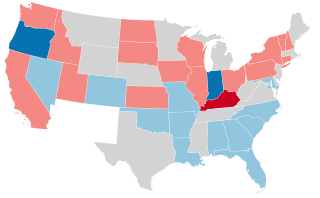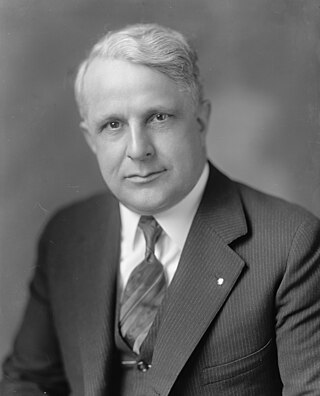
Philander Chase Knox was an American lawyer, bank director and politician. A member of the Republican Party, Knox served in the Cabinet of three different presidents and represented Pennsylvania in the United States Senate.

William BartSaxbe was an American diplomat and politician affiliated with the Republican Party, who served as a U.S. Senator for Ohio, and was the Attorney General for Presidents Richard M. Nixon and Gerald R. Ford, and as the U.S. Ambassador to India.

These are tables of congressional delegations from Indiana to the United States House of Representatives and the United States Senate.

The 1922 United States Senate elections were elections that occurred in the middle of Republican President Warren G. Harding's term. The 32 seats of Class 1 were contested in regular elections, and special elections were held to fill vacancies. With the Republicans divided between conservative and progressive factions, the Democrats gained six net seats from the Republicans while the Farmer–Labor party gained one. The Republicans retained their Senate majority.

William Evans Crow was an American lawyer and Republican party politician from Uniontown, Pennsylvania. He served in the Pennsylvania State Senate from 1907 until 1921, and was the body's President pro tempore in 1911. In 1921, he was appointed to the United States Senate, after Philander C. Knox died in office. Crow himself died in office less than a year after his appointment.

David Aiken Reed was an American lawyer and Republican party politician from Pittsburgh, Pennsylvania. He represented Pennsylvania in the United States Senate from 1922 to 1935.

The 1908–09 United States Senate elections were held on various dates in various states. As these U.S. Senate elections were prior to the ratification of the Seventeenth Amendment in 1913, senators were primarily chosen by state legislatures. Senators were elected over a wide range of time throughout 1906 and 1907, and a seat may have been filled months late or remained vacant due to legislative deadlock. However, some states had already begun direct elections during this time. Oregon pioneered direct election and experimented with different measures over several years until it succeeded in 1907. Soon after, Nebraska followed suit and laid the foundation for other states to adopt measures reflecting the people's will. By 1912, as many as 29 states elected senators either as nominees of their party's primary or in conjunction with a general election.

Ernest Willard Gibson was an American politician and lawyer from Vermont. A Republican, he served in both the United States House of Representatives (1923-1933) and United States Senate (1933-1940).

The 1920 New York state election was held on November 2, 1920, to elect the governor, the lieutenant governor, the secretary state, the state comptroller, the attorney general, the state treasurer, the state engineer, two judges of the New York Court of Appeals and a U.S. Senator, as well as all members of the New York State Assembly and the New York State Senate.

The 1914 New York state election was held on November 3, 1914, to elect the governor, the lieutenant governor, the Secretary of State, the state comptroller, the attorney general, the state treasurer, the state engineer, a U.S. Senator and a judge of the New York Court of Appeals, as well as all members of the New York State Assembly and the New York State Senate, and delegates-at-large to the New York State Constitutional Convention of 1915.

The 1904–05 United States Senate elections were held on various dates in various states, coinciding with President Theodore Roosevelt's landslide election to a full term and the 1904 House of Representatives elections. As these U.S. Senate elections were prior to the ratification of the Seventeenth Amendment in 1913, senators were chosen by state legislatures. Senators were elected over a wide range of time throughout 1904 and 1905, and a seat may have been filled months late or remained vacant due to legislative deadlock. In these elections, terms were up for the senators in Class 1.

The 1914 United States Senate election in Ohio was held on November 3, 1914. Republican nominee Warren G. Harding, future President of the United States, defeated Democratic nominee Timothy S. Hogan and Progressive Arthur L. Garford to succeed retiring incumbent Republican senator Theodore E. Burton.

The 1930 United States Senate special election in Pennsylvania was held on November 4, 1930. Joseph R. Grundy, incumbent Republican appointed to fill the vacancy created by the unseating of William Scott Vare, was defeated for re-nomination. The Republican nominee, James J. Davis, defeated Democratic nominee Sedgwick Kistler to win the election.

The 1922 United States Senate elections in Pennsylvania were held on November 7. Incumbent Republican U.S. Senator David A. Reed, who was appointed in August 1922 to fill the vacancy created by the death of William E. Crow, was elected both to complete the remainder of Crow's term, ending in March 1923, and to a full six-year term in his own right, beginning upon the expiration of Crow's term.

The 1922 United States Senate special election in Pennsylvania was held on November 7, 1922. Incumbent Republican Senator George Pepper, who had been appointed to the seat by Governor William Sproul following the death of Boies Penrose, was elected to fill the remaining four years on the term to which Penrose had been elected in 1920. Pepper comfortably defeated five other candidates, including Democratic nominee Fred Kerr of Clearfield County.

The 1905 United States Senate election in Pennsylvania was held on January 17, 1905. Incumbent Philander C. Knox was elected by the Pennsylvania State Assembly to his first full term in the United States Senate.

The 1909 United States Senate special election in Pennsylvania was held on March 16, 1909. George T. Oliver was elected by the Pennsylvania General Assembly to the United States Senate.
A member of the United States Senate can resign by writing a letter of resignation to the governor of the state that the senator represents. Under Article I, Section 3 of the Constitution of the United States, and under the Seventeenth Amendment, in case of a vacancy in the Senate resulting from resignation, the executive authority of the state can make a temporary appointment to fill the vacancy if so authorized by the state legislature. A special election may follow depending on timing and state law. Whenever a senator needs to be appointed or elected, the Secretary of the Senate mails one of three forms to the state's governor to inform that person of the proper wording to certify the appointment of a new Senator.



















